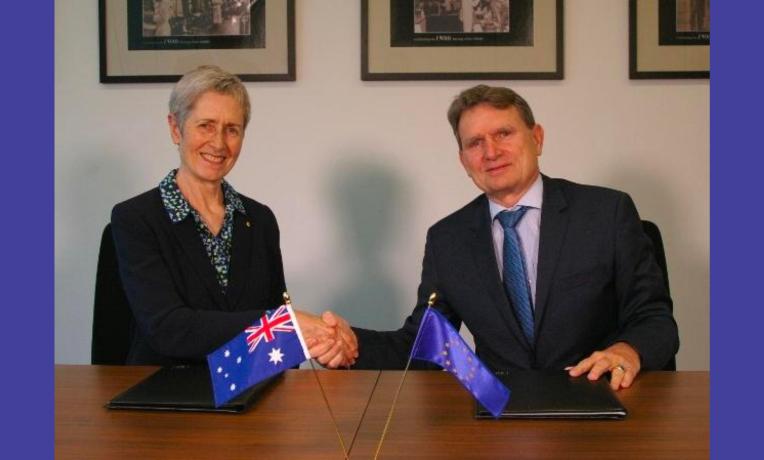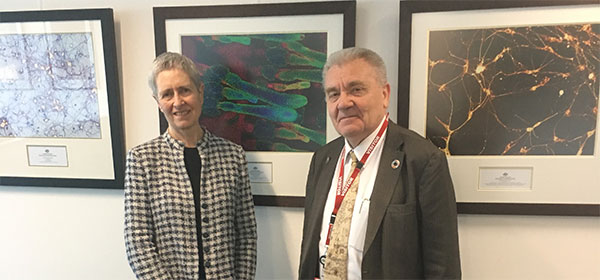
Today, the EU and Australia have launched a new initiative to provide opportunities for top Australian researchers to carry out research visits with teams funded by the European Research Council (ERC) in Europe. The National Health and Medical Research Council (NHMRC), Australia’s leading government investor in health and medical research, is the twelfth research agency to take part in such an initiative, which is part of the ERC's international strategy.
The deal was signed today by Prof. Anne Kelso, CEO for the NHMRC, and, on behalf of the European Commission, by Michael Pulch, Ambassador of the European Union to Australia, in Canberra. The agreement aims to help talented NHMRC-funded researchers to join ERC teams across Europe and enable the exchange of ideas and experiences in order to perform cutting-edge science together. It can be a single and long-term visit of up to 12 months or multiple short-term visits e.g. for joint experiments.
At the signing ceremony, Ambassador Michael Pulch said: "This new initiative is an important step to encourage Australian bright minds to spend time in high-calibre teams in Europe, funded by the EU through the European Research Council - such scientific cooperation in the field of health and medicine will benefit both sides. I am convinced that building bridges between Australia and the European Union will further foster world-class science."
The President of the ERC, Prof. Jean-Pierre Bourguignon, welcomed the agreement and said: "I am very pleased that this new opportunity for cooperation is launched today. My recent visit to some key research institutions in Australia allowed me to see the extent to which Australia-based scientists already cooperate with Europe and are eager to go even further. This signature reaffirms the ERC's belief in the importance of cross-border science and an open world in which the brightest minds can participate in knowledge creation through exchange and in this way contribute to science advancement."
The ERC, currently part of the EU's Horizon 2020 programme, offers long-term grants in Europe to top scientists of any nationality and in any field, including Life Sciences. To date, 46 Australian researchers have been awarded ERC grants across Europe, worth a total of over EUR 75 million, of which 25 are carrying out their blue sky research in the field of Life Sciences. In addition, it is estimated that around 300 team members of Australian nationality have been engaged in ERC-funded projects.
Background
The European Research Council is the premiere European funding organisation for excellent frontier research. It was set up by the European Union in 2007 and aims at selecting and funding excellent researchers of any nationality and age in order to run projects across the European Research Area.
To date, the ERC has funded over 9,000 individual researchers at various stages of their careers. It offers four core grant schemes: Starting, Consolidator, Advanced and Synergy Grants. As of 2019, ERC Synergy Grants will also be open to applicants based in host institutions outside the European Research Area.
Over 50,000 researchers and other professionals have been employed in ERC teams, as grantees on average employ around six team members. With grants open to talent of any nationality, the ERC strives to attract top researchers from anywhere in the world to come to work in Europe and encourages non-European scientists to join teams led by ERC grantees. Estimates show that around 17% of team members, who can also be based outside Europe, are non-European nationals.
The first initiative to encourage talent from outside Europe to temporarily work with ERC grantee-led research teams was signed in 2012 with the USA (National Science Foundation, NSF). Agreements, formally called Implementing Arrangement, then followed with prestigious funding bodies in South Korea, Argentina, Japan, China, South Africa, Mexico, Brazil and Canada.
The ERC is led by an independent governing body, the Scientific Council. The ERC President is Professor Jean-Pierre Bourguignon. The ERC has a budget of over €13 billion for the years 2014 to 2020, part of Horizon 2020, for which European Commissioner for Research, Innovation and Science Carlos Moedas is responsible.


